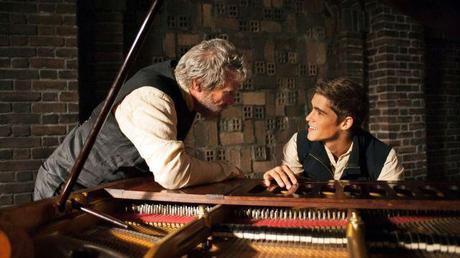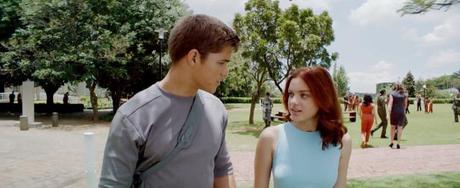Director: Phillip Noyce
Cast: Jeff Bridges, Meryl Streep, Brenton Thwaites, Alexander Skarsgård, Katie Holmes, Odeya Rush, Taylor Swift
Plot: In an apparent utopian society one young man is chosen to become the ‘Receiver’, a single individual who retains the collective memories of the past while the rest of world lives without emotion or risk. As he begins to experience real emotions for the first time he comes to disagree with the brave new world he lives in and seeks to make changes.
Review: Rottentomatoes shows a disparage between critics and audience. The critics have rated it at 33% and the audience at 65%. This is akin to the difference in opinion between those who have read the book and those who haven’t. It’s always quite snobbish to say this, but this adaptation was a rather poor effort. As a stand alone movie it’s not bad but it feels like they sourced it from the Wikipedia page more than the novel. The outline and premise is there but none of the drama, sense of wonder or heart.
What made Lowry’s novel such a joy to read is the slow and steady pace at which the world is rolled out. Everything appears as an idyllic utopia with its rituals and interactions laid out in detail, allowing the audience to pick up the clues that something it amiss for themselves before the protagonist Jonas wakes up to it. The turning point for Jonas occurs when one of the most unique creative choices of the story is revealed roughly halfway through. In the film version the ‘rules’ of the society are trotted out in a stilted and awkward voice over accompanied by on screen text just in case we couldn’t keep up. Then the change occurs after ten minutes. The first act jams in something like half the story, condensing key information down to snippets.

Of course things need to be trimmed out in an adaptation, but there’s some basics that need to occur in any story. Establishing the characters would be good, spending some time with the Jonas and his family so we can understand their relationship. Explore the roles within the community, such as how the babies get introduced into the family units and why. ‘Why’ is a term that seems to have been forgotten. Why does everyone take injections to remove their emotions? Why don’t people have their own children? The novel didn’t answer all of these question but the concepts and themes were explored to some degree and became the key discussion points for readers. The movie is in a terrible hurry to get past all the unique qualities of the story and deliver the bankable elements. Key example is Jonas’s best friend, who we are told in the opening VO that he’s funny…but we never see him do anything funny. It’s a visual medium guys. Show, don’t tell.
Ultimately this film seems to have been swept up in the Young Adult Dystopia cinema fad, stripped down to the most basic elements and the cast aged up from 12 to 17 to appeal to the intended viewers without any passion whatsoever. Marketing really did a number over this one. The main spiky haired character, his pouted lipped love interest and his supposedly funny friend have the worlds most nonsensical and tacked on love triangle. It manifests whenever ‘funny’ guy sees spiky hair and pouty lips hanging around, and he looks grumpy about it. What makes this especially nonsensical is that the characters don’t have emotions. If they don’t feel love or jealousy, how does this dynamic exist? Silly.

The movie is filmed pretty nicely, with some good design choices, and the performances do as well as expected. The ‘emotions are neat’ montages lifted off youtube wind up feeling like a Buzzfeed feature and the super happy scenes get overlaid with blur effect and shitty frame rate, which is annoying. If you don’t know the source material it’ll be a decent if forgettable movie, but if you’ve read the book you should skip it.
Rating: FOUR out of TEN
Edit: Shit, sorry, forgot that people may want to know if Taylor Swift had any acting chops. Who knows, she has less screen time then I do.

